Ghana’s fixed income market recorded comprehensive trading activity across all major security categories on September 19, 2025, reflecting growing investor confidence amid the country’s economic stabilization and declining inflation trajectory.
The Ghana Fixed Income Market (GFIM) trading report revealed activity spanning Government of Ghana (GOG) bonds, treasury bills, corporate bonds, Bank of Ghana (BOG) bills, and repo operations, demonstrating the market’s increasing depth and sophistication. Trading encompassed both new and old government securities, with robust participation across tenor categories from short-term bills to long-dated bonds.
New GOG notes and bonds dominated the session’s activity, including the 2023-GC series and Ghana Financial Stability Fund (GFSF) bonds, alongside United States Dollar (USD) denominated instruments. The diversified trading pattern underscored investors’ renewed appetite for Ghanaian sovereign debt as macroeconomic fundamentals strengthen significantly.
Ghana’s inflation plummeted to 11.5% in August 2025, its lowest in four years, prompting the Bank of Ghana to cut rates by 300 bps to 25%. This dramatic improvement in price stability has created a favorable environment for fixed income investment, with government bond yields falling substantially and the cedi appreciating against major currencies.
The trading session included extensive activity in old GOG notes and bonds across multiple tenor categories, ranging from five-year to twenty-year securities. These instruments, which were previously exchanged for new bonds under the government’s debt restructuring program, continue attracting secondary market interest as yields remain attractive relative to regional peers.
Corporate bond trading featured prominent Ghanaian issuers including Letshego Ghana PLC, Bayport Savings and Loans PLC, Ghana Cocoa Board, Izwe Savings and Loans PLC, Kasapreko PLC, and Quantum. The participation of diverse corporate entities reflects the market’s growing capacity to accommodate private sector funding needs alongside government requirements.
Treasury bill activity spanned all major tenors with 91-day, 182-day, and 364-day bills attracting investor interest. The short-term government securities market remains a crucial component of Ghana’s debt management strategy, providing essential liquidity while offering investors relatively secure returns during the economic transition period.
BOG bills, including 56-day and 273-day instruments, recorded trading volumes that demonstrate the central bank’s active participation in monetary policy implementation through open market operations. These specialized instruments serve dual purposes of managing system liquidity while providing additional investment options for institutional participants.
The market’s repo operations encompassed both collateralized and Global Master Repurchase Agreement (GMRA) trades, indicating sophisticated institutional activity. Repo markets serve critical functions in providing short-term financing and managing liquidity, with various transaction stages including matched, settled, failed, and expired positions tracked comprehensively.
The Bank of Ghana has slashed its benchmark Monetary Policy Rate by 350 basis points to 21.5%, citing sustained disinflation, easing inflation expectations, and a stronger external sector. This aggressive monetary easing cycle has supported bond market performance while encouraging broader financial market participation.
Sell and buy-back trades for GOG bonds provided additional market depth, allowing participants to manage positions flexibly while maintaining exposure to government securities. These mechanisms enhance market liquidity and facilitate more efficient price discovery across the yield curve.
The comprehensive trading activity occurs against a backdrop of Ghana’s ongoing economic recovery following successful completion of debt restructuring negotiations with international creditors. Improved fiscal metrics, declining debt service ratios, and stabilizing external accounts have restored investor confidence in Ghanaian assets.
Market participants increasingly view Ghana’s fixed income instruments as attractive relative to regional alternatives, particularly given the country’s commitment to fiscal discipline and structural reforms. The diversity of trading activity suggests institutional investors are building strategic positions across the maturity spectrum.
Looking ahead, continued improvements in Ghana’s macroeconomic fundamentals should support further development of the fixed income market. Lower inflation, declining interest rates, and currency stability create favorable conditions for both government and corporate issuers to access capital markets efficiently.
The September 19 trading session demonstrates the Ghana Fixed Income Market’s evolution into a sophisticated platform capable of handling diverse instruments and complex transactions. This development positions Ghana’s capital markets favorably within the West African region and among emerging market peers.
Source: newsghana.com.gh











